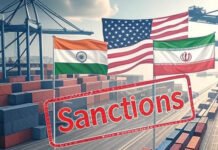In a move that has surprised many, Saudi Arabia and Iran have agreed to reopen their diplomatic missions in their respective capitals and other cities, marking a significant thaw in their relationship after years of animosity. This diplomatic breakthrough comes after an Iranian delegation reached Saudi Arabia to pave the way for Riyadh to reopen its diplomatic missions, following mediation by China.
The History of Tension between Saudi Arabia and Iran
Saudi Arabia and Iran are two of the largest and most influential countries in the Middle East. The two nations have been long-time rivals, with deep-seated religious and political differences. The tension between the two nations can be traced back to the Islamic Revolution in Iran in 1979, which saw the rise of a Shia theocracy that sought to export its revolution to other countries in the region. Saudi Arabia, a Sunni monarchy, viewed this as a direct threat to its own legitimacy and regional influence.
Since then, the two nations have been involved in a series of proxy conflicts throughout the region, with each supporting opposing sides in countries like Syria, Yemen, and Iraq. This has resulted in a deepening of mistrust and animosity between the two nations, with each viewing the other as a destabilizing force in the region.
The Significance of Reopening Diplomatic Relations
The decision to reopen diplomatic relations between Saudi Arabia and Iran is a significant development, given the long history of tension and conflict between the two nations. It is a reflection of a changing geopolitical landscape in the region, with both nations recognizing the need for cooperation in the face of common challenges.
The reopening of diplomatic missions is expected to facilitate greater communication and dialogue between the two nations, which could potentially lead to a reduction in tensions and a resolution of some of the conflicts in the region. It is also seen as a major diplomatic victory for China, which mediated the talks between the two nations and is looking to increase its influence in the region.
The Role of China in the Diplomatic Breakthrough
China has played a key role in mediating the talks between Saudi Arabia and Iran, and its involvement in the region is a reflection of its growing economic and strategic interests. China has been investing heavily in the region, particularly in countries like Saudi Arabia and Iran, and is looking to increase its influence in the region as the United States withdraws its troops.
China’s involvement in the talks between Saudi Arabia and Iran is also seen as a reflection of its increasing role as a global power, particularly in the Middle East. The diplomatic breakthrough between Saudi Arabia and Iran is a significant achievement for China, which is looking to establish itself as a major player in the region.
The Future of Saudi Arabia-Iran Relations
The reopening of diplomatic missions between Saudi Arabia and Iran is a positive step towards greater cooperation and communication between the two nations. It is a reflection of a changing geopolitical landscape in the region, with both nations recognizing the need for cooperation in the face of common challenges.
However, it is important to recognize that the reopening of diplomatic missions is just the first step in a long process towards reconciliation between the two nations. There are still deep-seated political and religious differences between Saudi Arabia and Iran, which will not be easily resolved. It will require sustained efforts from both nations to build trust and overcome their differences.
Conclusion
The decision by Saudi Arabia and Iran to reopen their diplomatic missions is a significant development in the history of their long-standing rivalry. It reflects a changing geopolitical landscape in the region, with both nations recognizing the need for cooperation in the face of common challenges. The role of China in mediating the talks between the two nations is also a reflection of its increasing role as a global power.
















